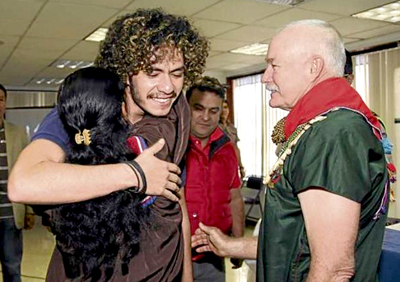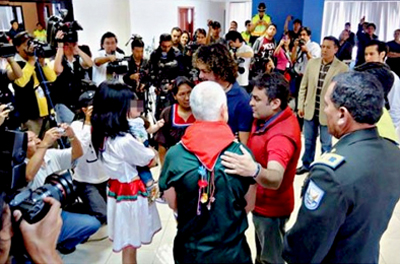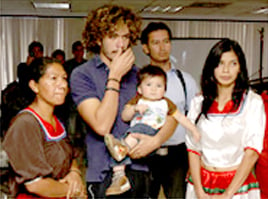 |
| Phil Borman's joyful reunion with his parents, Amelia and Randy Borman, after escaping from his kidnappers. Photo courtesy of El Comercio. |
(Sept. 14, 2012 - by Ralph Kurtenbach) The night of Thursday, Aug. 30, for Phil Borman was like the other 39 nights as a hostage-he was chained securely under the shelter of a plastic tarp. His guards had allowed him a flashlight and rubber boots.
Staying up late and quietly working the chains, he'd released himself by 1 a.m. as the guards slept nearby. Then the 24-year-old captive silently slipped away toward the San Miguel River to cross into northeastern Ecuador's Sucumbíos province, home to three generations of Bormans.
"After swimming [across] the river, he headed upstream, trying to get distance from his captors," his uncle, Rick Borman, wrote afterwards. In search of a road, the young Ecuadorian-American headed into the jungle-an environment where he felt at home, having grown up in the rainforest.
"The denseness of the jungle and the bamboo groves kept turning him back downriver but he kept on," Rick related. "He finally came upon a house in the jungle and woke up the owners."
Phil needed three things: secrecy, directions to the nearest road and socks. Soon he was on his way again but "about this time shots rang out from across the river somewhere and motorized canoes could be heard going up and down the river."
Three hours into his escape, he realized his captors were in hot pursuit. Farther down the road, Phil acquired a cell phone and began a series of unsuccessful attempts to reach his parents, Randy and Amelia Quenama Borman. Amelia is Cofán.
Phil's father, Randy Borman, was born in Ecuador in the 1950s after his parents, Bub and Bobbi Borman, arrived to evangelize and live among the Cofán people. Now a revered chief among the Cofán, he helps them to integrate into Ecuadorian society even as they rebuff incursions into their protected lands.
His major effort is based in Nueva Loja, the capital city of Sucumbíos where Randy oversees the Fundación de Sobrevivencia del Pueblo Cofán (Cofán Survival Fund). His son Phil, a university graduate in political science, works as an activist defender of the rights of the Cofán people.
 |
| Members of the Ecuadorian media swarm Phil Borman as he is reunited with his family. Photo courtesy of El Telégrafo. |
At the foundation's offices on Monday, July 23, armed men had ambushed and tied up some teens at the gatehouse, burst into the office, locked the office staff in a bathroom and abducted Phil.
Phone calls from the captors-with Colombian accents-had followed in the ensuing days. So when Phil called on Aug. 30, both his father and foundation staff ignored the calls from an unknown number as police had instructed them to do.
Finally at about 10 a.m. Phil desperately called the Cofán foundation's Quito office and reached the staff there. But this only "put them on alert, thinking that it may be some ruse by the kidnappers to get them to call the number. They had no idea he had escaped," Rick recounted.
Repeating the effort, Phil finally made it known that he was free of the kidnappers. Then returning the call, Randy heard his son answer in English, a sure sign that he had escaped his captors, knowing they only allowed him to speak in Spanish.
Phil detailed his location. Then as quickly as possible-delayed by a truck across the road and a cell phone that had run out of minutes-Randy returned the call with police at his side.
More police officers than Randy ever imagined were on the case as they appeared, armed and wearing bulletproof vests. Soon the police helicopter pilot was making low passes over the area pinpointed by Phil in order to frighten off the captors.
Once Phil made visual contact with the chopper crew, the ground crew was notified and they picked him up at a rendezvous point. "He was then flown to the capital city of Quito and kept protected by the police," the relative wrote. The following day after a debriefing and press conference, Phil met with family members, including his wife, Gissela, and the couple's 8-month-old son, Nigel.
 |
| Phil Borman with his mother, son and wife after being reunited in Quito. Photo courtesy of El Comercio. |
Through coordinated efforts by four elite Ecuadorian police units-the Intervention and Rescue Group (GIR), the Special Operations group (GOE), the Anti-Kidnapping/Extortion Unit (UNASE) and the Air Police Service-were supported by Colombian police. Phil's freedom was realized "without a penny of ransom paid," according to Ecuador Interior Minister José Serrano.
The country's elite anti-kidnapping/extortion police force, UNASE, has achieved a 99-percent record of safe recoveries in kidnapping situations during its 14 years of existence. According to the Ministry of the Interior, 20 kidnapping cases were reported so far this year, 18 of which have been solved. That compares to 64 reported kidnappings in Ecuador in 2010-2011. Not all kidnappings are reported.
Randy said it was a huge relief to have his son reunited with his family. The conditions were not all that bad for a "jungle boy"-food was regular, the mattress and bedding were dry and the guards were accessible, he recounted. "But the terrible uncertainty of knowing we were in danger as well gnawed at Phil constantly."
Sources: HCJB Global, El Comercio, La Hora, El Telégrafo, El Universo
